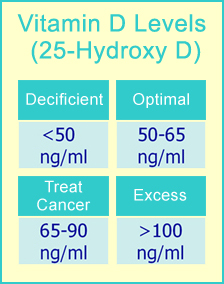Vitamin D and Cancer Prevention
Keeping your vitamin D levels optimized is vital in fighting or preventing cancer and other diseases.
I love being in the sunshine, which is the most important natural source of vitamin D. I lie on the beach when possible, and go outside most days, midday, for at least an hour during the summer (using appropriate sunscreen protection!). When I am talking to a friend on the street, I always make sure we are standing in the sunshine. I go to warm, sunny places often.
On the dietary front, I have always had a voracious appetite for dairy products, including grass-fed, raw milk — another great source of vitamin D.

I have also intermittently taken 4,000 to 5,000 IU of supplemental vitamin D (cholecalciferol) daily.
Have your vitamin D level tested once a year. When these levels are low, add supplemental vitamin D and retest until the levels are appropriate.
As a younger adult, I had never had my own vitamin D levels tested, because I thought that it just wouldn't be possible for me to have low levels of vitamin D.
When I finally had my vitamin D levels checked. I was shocked. My vitamin D 25-OH (25-hydroxy D) level was a whopping 31. The doctor told me this was just fine. The range my doctor's office considers to be normal is 20-100 ng/mL. Quite a range, wouldn't you say?

However, I knew differently. The minimum healthy vitamin D level is 50 ng/mL (see chart) and 50 is too low if you are fighting cancer or a chronic illness such as fibromyalgia or irritable bowel syndrome (IBS) or if you simply want to reduce your risks of these health troubles.
Cancer is the number one killer in the United States. In 2019, an estimated 606,880 people will die of cancer in the United States.
Yes, a healthy diet is a cornerstone of prevention. Yes, coffee enemas are an excellent preventative measure. Yes, optimizing your adrenal health is important.
Regarding vitamin D, although some scientific research lists slightly lower levels as adequate, a number of studies agree that at higher levels, vitamin D can be beneficial for cancer prevention, and if your levels are too low (which is very common), taking vitamin D supplements can help bring your vitamin D levels into an ideal range that some of these studies have identified.
By Kristina Amelong, CCT, CNC
I-ACT-Certified Colon Hydrotherapist
Certified Nutritional Consultant